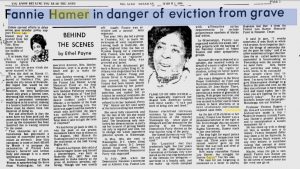Black History Month should be a time of celebration of achievement and honest reflection on the impediments to freedom for all. Civil rights leader Fannie Lou Hamer is one of many who broke through the generational shackles of poverty to live a life devoted to helping free others from the same bondage.
Hamer was born into poverty in 1917 (the youngest of 20 children), which according to Planned Parenthood’s philosophy, was a circumstance worthy of eliminating her. Since the age of 6, she worked in the cotton fields with her sharecropping family and was forced to leave school at the age of 12.
But Fannie Lou Hamer, like many other remarkable figures in American history, defied the disproven narrative that poverty cannot birth greatness. She and her husband, Perry “Pap” Hamer, tirelessly toiled on a Mississippi plantation. He worked in the fields (basically as a slave, just in a different legal form) while she, armed with the ability to read and write, worked in the big House. In 1962, her life took an even more drastic turn.
She was diagnosed with a small uterine tumor, but instead of simply removing it, the doctor performed a hysterectomy without her consent. Pro-abortion activists often refer to Hamer’s ordeal as “Mississippi Appendectomies,” a term which Hamer coined. These unjust acts were done to thousands of women across the country, like North Carolinian Elaine Riddick. Abortion activists won’t mention those sterilizations were heavily promoted by Planned Parenthood or that Fannie Lou Hamer was, actually, passionately pro-life. This traumatic experience was the catalyst for her social activism, to fight the incredible injustice that black Americans faced, daily, in America.

She fought for the right of black Americans to vote, risking her very life as she survived violent attacks for her public crusade for rights guaranteed by the Constitution. She never gave up. Hamer wanted to provide a better world for black children who were constantly the target of racist efforts that forced birth control and other eugenic social policies masquerading as anti-poverty measures. According to black journalist Samuel F. Yette (who was fired by Newsweek for penning his book, “The Choice” which detailed Nixon’s eugenics and population control tactics): “Mrs. Hamer is a symbol of what was good about the 1960s. She symbolized the will of many not merely to illuminate the society’s worst contradictions, but also to erase them.
Hamer was quoted by Yette as saying, during a 1969 White House Conference on Hunger (renamed the Conference on Food, Nutrition, and Health): “I didn’t come to talk about birth control. I came here to get some food to feed poor, hungry people. Why are they carrying on that kind of talk?” The conference passed a resolution that called for “free birth control for young girls, with or without parental consent, required abortions of unmarried girls discovered during the first three months of their pregnancy, and forced sterilization of any such girl giving birth out of wedlock the second time.” Yette described her as “shocked” and “outraged” by the resolution and she stormed into the meeting area and demanded the resolution be reconsidered. Clearly Hamer carried some authority because they took another vote and the resolution was defeated!
Hamer never minced words. And her position on moral issues was crystal clear which is why I hate to see Planned Parenthood try to exploit her legacy by quoting her as if she would stand with the leading killer of black lives. In her 1970 speech “America is a Sick Place and Man is on the Critical List” she explained her opposition to population control: “So we got all kinds of children, and I’ll tell you the next thing that I don’t buy, I don’t buy distributing birth control pill and legalizing abortion, because they’re talking about us! If you want to abortionize somebody, do it to yourself because [I’m] going to try to keep the children.”
Ethyl Payne, a journalist for the Afro American, described Hamer as a “passionate believer in the right to life” in a March 1980 column. Payne reported that the freedom fighter “spoke out strongly against abortion as a means of genocide of blacks.”
In her 1971 speech “Is It Too Late”, Hamer wasn’t ambiguous at all about abortion, saying: “The methods used to take human life, such as abortion, the pill, the ring, etc., amount to genocide. I believe that legal abortion is legal murder and the use of pills and rings to prevent God’s will is a great sin.”
Yes. Genocide. Did you catch that #BlackLivesMatter activists? Across the country, this hashtag movement decries the estimated annual 250-300 needless black (police-involved) deaths of which 80% of those individuals were armed with a deadly weapon. This same Marxist movement celebrates an industry’s slaughter of over 320,000 unarmed black lives in the womb as “reproductive justice.” There’s no justice in the killing of the innocent. None.
Hamer would hammer away at uninformed activists who blindly support the most institutionalized form of racism—abortion. BLM has announced solidarity with Planned Parenthood and the abortion industry.
Fannie Lou Hamer was a freedom fighter who spoke with passion borne of a life of hardships. She connected with people, black and white. As a victim of  eugenic sterilization, racial discrimination, and a Democrat party that refused to racially integrate (hence her speech at the 1964 DNC Credentials Committee to demand black representation at the Convention), she spoke out against injustice. She left an indelible mark on the conscience of a nation. She was truly fearless.
eugenic sterilization, racial discrimination, and a Democrat party that refused to racially integrate (hence her speech at the 1964 DNC Credentials Committee to demand black representation at the Convention), she spoke out against injustice. She left an indelible mark on the conscience of a nation. She was truly fearless.
She used to sing “This Little Light of Mine” often. It was her anthem. She let her light shine outside and inside her home. Fannie Lou and “Pap” Hamer were adoptive parents who, due to the tragic loss of their adopted daughter Dorothy Jean and injuries sustained in war by their son-in-law, adopted their own grandchildren. After her passing, Yette wrote that “Fannie Lou Hamer tried to feed and educate the children, to guard life and enhance its nobility.”
Pro-life factivism is a continuum. Forget the favorite pro-abortion baseless mantra that we “don’t care about children once they’re born.” We care about life no matter the age or stage. We may not agree with everyone on how that help is given, but all the evidence shows the extensive nature of how pro-life, pro-family, pro-restoration organizations and the Church care for the poor, the broken and those in need. History reminds us that when we fail to care for the least of these and deem them as “unwanted” or a “burden” (whether born or unborn), only violence and destruction follow.
Nearly five decades of Roe have eliminated 64 million beautiful possibilities. They’re gone. These are millions who could’ve shone their lights brightly but, instead, were violently extinguished. An estimated 20 million black lives, possible freedom fighters like Hamer, have been erased by abortion from the annals of history. But we will not forget them.
As Hamer once proclaimed: “Nobody’s free until everyone’s free.” Here’s to a pro-life generation that is rising up, realizing that the best way to celebrate Black History American History is to fight to protect our very future—our Posterity.
 Ryan Bomberger is the Chief Creative Officer and co-founder of The Radiance Foundation. He is happily married to his best friend, Bethany, who is the Executive Director of Radiance. They are adoptive parents with four awesome kiddos. Ryan is an Emmy Award-winning creative professional, factivist, international public speaker and author of NOT EQUAL: CIVIL RIGHTS GONE WRONG. He loves illuminating that every human life has purpose.
Ryan Bomberger is the Chief Creative Officer and co-founder of The Radiance Foundation. He is happily married to his best friend, Bethany, who is the Executive Director of Radiance. They are adoptive parents with four awesome kiddos. Ryan is an Emmy Award-winning creative professional, factivist, international public speaker and author of NOT EQUAL: CIVIL RIGHTS GONE WRONG. He loves illuminating that every human life has purpose.
The views expressed in opinion articles are solely those of the author and are not necessarily either shared or endorsed by Black Community News.
Do you like this post? Sign up for more!
 CURE News and Clergy Blog News and Commentary for Christians
CURE News and Clergy Blog News and Commentary for Christians



